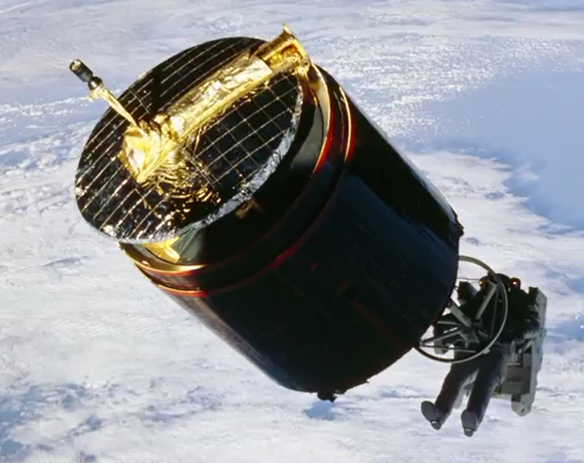Hey Squeaks, what are you looking at?
嘿,吱吱,你在看什么呢?
Oh! It looks like Squeaks noticed an interesting light moving across the night sky,
噢,吱吱注意到一道有趣的光滑过夜空,
and he's trying to figure out what it is!
它正试着弄清楚那是什么呢!
You know, I don't think that's a meteor and I don't think it's an airplane either.
我认为它不是流星,也不是飞机。
It's moving very steadily in a straight line across the sky, and it's not twinkling or blinking.
它正稳稳地直线穿过天空,没有闪烁。
That means it's probably a satellite!
这意味着它可能是一颗卫星!
A satellite is something that orbits or goes around a planet or a star,
卫星围绕行星或恒星旋转,
and there are lots of different types.
它们有很多不同类型。
Some natural things are satellites, like the moon, because it goes around the Earth.
有些是天然卫星,比如月球,因为它绕地球旋转。
But usually, when people talk about satellites
但通常,人们指的卫星
they mean the ones that were made by people and launched into space.
是那些由人制造并发射到太空的卫星。
They're sort of like spaceships moving around the Earth,
它们有点儿像围绕地球旋转的太空飞船,
and they're usually made up of a computer, along with solar panels to get power from the sun.
通常由计算机和获取太阳能的太阳能板组成。
Sometimes they also have cameras or other scientific tools to help gather information.
有时它们也携带照相机或其他科学工具,来帮助自己收集信息。
People sent our very first satellite into space in the year 1957.
1957年,人们把第一颗卫星送入太空。
It was called Sputnik, and it was only about the size of a beach ball!
它叫“Sputnik”,只有一个沙滩球那么大。
These days, there are more than 2000 satellites up there!
现在,太空的卫星有2000多颗!

I know! It's hard to even imagine so many things moving around the planet at the same time!
我知道,很难想象那么多卫星同时围绕行星旋转!
But they have all kinds of different jobs.
但它们有各种各样不同的工作。
Some satellites help us study the Earth.
有些卫星帮助我们研究地球。
For example, they can take pictures or collect data about the Earth's surface.
例如,它们可以拍照或收集有关地球表面的数据。
That way, scientists can learn more about things like the temperature of the oceans
这样,科学家就可以了解更多关于海洋温度的信息,
and see what's happening to the glaciers and other types of ice all over the world.
看看世界各地的冰川和其他类型的冰发生了什么。
Satellites can also monitor the weather,
卫星也可以监测天气,
which meteorologists, the scientists who study the weather, use to learn about big storms like hurricanes.
研究天气的气象学家用它们来了解飓风这样的大风暴。
But scientists aren't the only people who use satellites.
但是科学家并不是唯一使用卫星的人。
Turns out that you and me, and even Squeaks benefit from using satellites all the time!
事实证明,你我甚至吱吱都一直从使用卫星中获益。
Whenever you use the map on a phone or in a car to go somewhere,
无论何时,你在电话或汽车上使用地图去某个地方,
it's using satellites in space to figure out where you are so it can tell you where to go!
都要利用太空中的卫星来定位,这样它们才能告诉你去哪里。
Some types of TVs and phones also use satellites,
有些电视和电话也利用卫星。
because sometimes it can be easier to send information to far away places on Earth
因为有时候,如果你用卫星作信使,
if you use a satellite as the messenger.
将信息发送到遥远的地方会更容易。
With satellite TV for example, the signals from all the channels get sent to a satellite,
以卫星电视为例,所有频道的信号都被发送到卫星上,
which then sends the signals back down to lots of people's houses and their TVs!
然后它把信号发回到很多人的房子和电视上!
The biggest satellite orbiting our planet is the International Space Station.
绕地球运行的最大卫星是国际空间站。
It's as big as a football or soccer field, and people actually live on it!
它有足球场那么大,实际上人们可以在上面生活!
There are usually six astronauts on the space station at a time,
每次空间站通常有六名宇航员,
and most of them stay there for about six months.
大多数人在那里待6个月。
When they're floating around on the space station,
当他们在空间站漂浮的时候,
they can do all kinds of cool science experiments that they couldn't do here on Earth!
可以做各种各样在地球上做不到的有趣科学实验。
And Squeaks, I think that's what you saw moving across the sky, the International Space Station!
吱吱,我想你看到得划过天空的东西是国际空间站!
You can usually see the space station on a clear night
你通常可以在晴朗的夜晚看到它,
if it's flying over where you live not too long after the sun goes down.
前提是它在太阳下山后不久飞经你住的地方。
It'll look like a little point of light moving in a steady, straight line
它看起来就像一个小光点,沿直线稳定得移动,
all the way across the sky, with no blinking lights.
穿过天空,没有闪光。
Which is exactly what Squeaks saw!
这和吱吱看到的太像了!
I don't know about you, Squeaks,
吱吱,我不知道你怎么想的,
but I'm definitely going to be thinking about satellites the next time I watch TV and give a phone call.
但我下次看电视或打电话时,绝对会想到卫星。
And we should keep a lookout for the Space Station the next time it goes zooming by!
下次空间站再次划过时,我们应该关注一下!
Thanks for joining us!
感谢您的收看!
If you want to keep learning and having fun with Squeaks and me, hit the subscribe button,
如果你想继续学习或与我和吱吱共度美好时光,就点击订阅吧,
and we'll see you next time, here at the Fort!
我们下期见,沃斯堡等你哦!












